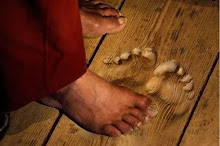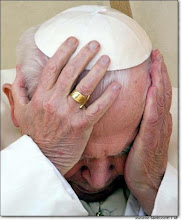
30 August 2008
23 August 2008
22 August 2008
Is the real point that one returned or that ten were healed?
Where are the nine?
By: Martin Bell
How about a word or two on behalf of the nine lepers who did not return to give thanks? The Gospel reads something like this: there were ten lepers cleansed and one of them – just one of the – when he saw he was healed, turned back and in a loud voice glorified God and fell down on his face at Jesus’ feet, giving him thanks.
And Jesus answered saying, “Were there not ten cleansed? But where are the nine?”
Ten lepers were cleansed and one of them returned to give thanks. That must be a nice thing to be able to do.
What about the others? It’s simple, really. One of them was frightened – that’s all. He didn’t understand what had happened and it frightened him. So he looked for a place to hide. Jesus scared him.
A second was offended because he had not been required to do something difficult before he could be healed. It was all too easy. He had expected months, maybe years, of fasting and prayer and washing and righteous living to be the requirement. But he had done none of this. He had not earned his reward. His motto was, “you get what you pay for.” and so Jesus offended him.
The third realized too late that he had not really wanted to be cleansed. That he did not know what to do or how to live or even who he was without leprosy. Although it had been his fervent plea to be healed, he now began to see how much he needed his leprosy and consequently how necessary it had been in defining him as a person. Jesus had taken away his identity.
It is difficult to explain the reason why the fourth leper did not return to give thanks. Perhaps, it is because it is such a simple reason – and perhaps because we very nearly tread on holy ground even to talk about it. In a word, the fourth leper did not return because, in his delirium of joy, he forgot. He forgot. That’s all, he was so happy, he forgot.
The fifth leper was unable to say thank you anymore to anybody. There is something that happens to a man who must beg and who is shunned by his fellows, and who is grudgingly thrown a few coins and who is always – in the midst of such an existence and in the face of such treatment (perhaps even because of such treatment, for instance, the few coins) – expected to say thank you. He just doesn’t say thank you any more to anybody – not even Jesus.
The sixth leper was a woman – a mother who had been separated from her family for eleven years because of the leprosy. She was now free to rejoin her husband and her children. She did not return to give thanks because she was hurrying home. Like a wild animal released from captivity, she had been freed by Jesus. And like the animal, she simply went straight home.
The seventh didn’t believe that Jesus had anything to do with the cleaning. He knew that healing had taken place, but why and how were the questions. Certainly he did not believe in hocus pocus, magic, miracles – any of that. There was a perfectly intelligible explanation of what had happened, but it didn’t have anything to do with Jesus. He didn’t return to give thank because Jesus had nothing to do with the healing events.
The eighth leper did not return precisely because he did believe that Jesus had healed him – that the Kingdom of God was here and the Messiah had arrived. To return to give thanks when the Kingdom of God was so close at hand – unheard of! And so he ran to publish the news!
What shall I say about the ninth leper? What he was his experience? Why didn’t he return? I don’t know the answer to either of those questions. All I know is that he showed himself to the priest and immediately was cleansed. He then stood still for a moment and smiled. The priest reports that the ninth leper gave two utterances. First he said, “So!” And then, “Ah, yes!” Without another word he walked away. His eyes blazed fire but his shoulders sagged as if under a great burden. The air around him was silent…
Ten were cleansed and only one returned. It must be nice to be able to do that. What shall I say now – that the real point is not the one returned but that ten were cleansed? You already know that. That condemnation is easier than investigation – that if we take the time to investigate the reasons why people act as they do, we would find that they have to act the way that they do and that such action in light of the circumstances is quite understandable and totally forgivable and even completely reasonable and just as it should be? You already know that.
What then shall I say? That it is good to give thanks? Yes. That it is understandable not to give thanks? Yes. That God does not heal people and than stand around just waiting for us to say thank you and then get angry and have his feelings hurt if we don’t. Yes, that’s true. Which is the same thing as saying – no he certainly doesn’t.
But what of the nine? They are on the way home, hiding in fear, refusing to believe, offended at what they call cheep grace, so happy they forgot, lost without their leprosy, unable to say thank you ever again, publishing the news of the coming Kingdom – God, who knows where they are! The point is this: Jesus does. He knows where they are. First he says to the leper who did return, “Arise, go they way” and then he goes on his own way – with a strange smile on his lips.
But where are the nine? Don’t you see it in his eyes? He knows where they are. He knew all along. Without another word, Jesus walks away. His eyes blaze fire and his shoulders sag as if under a great burden. The air around him is silent…
By: Martin Bell
How about a word or two on behalf of the nine lepers who did not return to give thanks? The Gospel reads something like this: there were ten lepers cleansed and one of them – just one of the – when he saw he was healed, turned back and in a loud voice glorified God and fell down on his face at Jesus’ feet, giving him thanks.
And Jesus answered saying, “Were there not ten cleansed? But where are the nine?”
Ten lepers were cleansed and one of them returned to give thanks. That must be a nice thing to be able to do.
What about the others? It’s simple, really. One of them was frightened – that’s all. He didn’t understand what had happened and it frightened him. So he looked for a place to hide. Jesus scared him.
A second was offended because he had not been required to do something difficult before he could be healed. It was all too easy. He had expected months, maybe years, of fasting and prayer and washing and righteous living to be the requirement. But he had done none of this. He had not earned his reward. His motto was, “you get what you pay for.” and so Jesus offended him.
The third realized too late that he had not really wanted to be cleansed. That he did not know what to do or how to live or even who he was without leprosy. Although it had been his fervent plea to be healed, he now began to see how much he needed his leprosy and consequently how necessary it had been in defining him as a person. Jesus had taken away his identity.
It is difficult to explain the reason why the fourth leper did not return to give thanks. Perhaps, it is because it is such a simple reason – and perhaps because we very nearly tread on holy ground even to talk about it. In a word, the fourth leper did not return because, in his delirium of joy, he forgot. He forgot. That’s all, he was so happy, he forgot.
The fifth leper was unable to say thank you anymore to anybody. There is something that happens to a man who must beg and who is shunned by his fellows, and who is grudgingly thrown a few coins and who is always – in the midst of such an existence and in the face of such treatment (perhaps even because of such treatment, for instance, the few coins) – expected to say thank you. He just doesn’t say thank you any more to anybody – not even Jesus.
The sixth leper was a woman – a mother who had been separated from her family for eleven years because of the leprosy. She was now free to rejoin her husband and her children. She did not return to give thanks because she was hurrying home. Like a wild animal released from captivity, she had been freed by Jesus. And like the animal, she simply went straight home.
The seventh didn’t believe that Jesus had anything to do with the cleaning. He knew that healing had taken place, but why and how were the questions. Certainly he did not believe in hocus pocus, magic, miracles – any of that. There was a perfectly intelligible explanation of what had happened, but it didn’t have anything to do with Jesus. He didn’t return to give thank because Jesus had nothing to do with the healing events.
The eighth leper did not return precisely because he did believe that Jesus had healed him – that the Kingdom of God was here and the Messiah had arrived. To return to give thanks when the Kingdom of God was so close at hand – unheard of! And so he ran to publish the news!
What shall I say about the ninth leper? What he was his experience? Why didn’t he return? I don’t know the answer to either of those questions. All I know is that he showed himself to the priest and immediately was cleansed. He then stood still for a moment and smiled. The priest reports that the ninth leper gave two utterances. First he said, “So!” And then, “Ah, yes!” Without another word he walked away. His eyes blazed fire but his shoulders sagged as if under a great burden. The air around him was silent…
Ten were cleansed and only one returned. It must be nice to be able to do that. What shall I say now – that the real point is not the one returned but that ten were cleansed? You already know that. That condemnation is easier than investigation – that if we take the time to investigate the reasons why people act as they do, we would find that they have to act the way that they do and that such action in light of the circumstances is quite understandable and totally forgivable and even completely reasonable and just as it should be? You already know that.
What then shall I say? That it is good to give thanks? Yes. That it is understandable not to give thanks? Yes. That God does not heal people and than stand around just waiting for us to say thank you and then get angry and have his feelings hurt if we don’t. Yes, that’s true. Which is the same thing as saying – no he certainly doesn’t.
But what of the nine? They are on the way home, hiding in fear, refusing to believe, offended at what they call cheep grace, so happy they forgot, lost without their leprosy, unable to say thank you ever again, publishing the news of the coming Kingdom – God, who knows where they are! The point is this: Jesus does. He knows where they are. First he says to the leper who did return, “Arise, go they way” and then he goes on his own way – with a strange smile on his lips.
But where are the nine? Don’t you see it in his eyes? He knows where they are. He knew all along. Without another word, Jesus walks away. His eyes blaze fire and his shoulders sag as if under a great burden. The air around him is silent…
The Wheat and the Tares... and me
The Wheat and the Tares
By: Martin Bell
The Kingdom of God, Lord, is like so many things. Yet, like nothing at all I have ever known. Perhaps my poor head will never even grasp a single strand from your complex multiplicity of images. But the story of the wheat and tares will always be the hardest for me to understand. Because, at the end, the man burns the tares. And if the tares represent people, Lord, I’ll never understand that. Never.
The Kingdom of God is like so many things. Did you mean for the wheat to represent good people, Lord? And are the tares then desperate and evil men whose willful sins are so bound to them that there is no release – only the fire? And is it somehow a stranger who stands responsible, after all? (I mean ultimately responsible, since it is he who has sown the tares in the first place?) Is that what the story means, Lord? That God created good men? And somehow a stranger brought into being a number of bad men? And that the good men and the bad men must continue to live together side by side until the day of judgment when they will be either rewarded or punished? God, I hope that’s not what the story means. Partly because I am an evil and desperate man. More because I am willfully an evil and desperate man. Heard this way, the story promises me nothing but the fire. Lord, will there be nothing for me but the fire?
The Kingdom of God is like so many things. Yet, like nothing I have ever known. For there is no godliness in my daily walks amidst the meaningless drudgery of my life. There is only disappointment. And, at that, hardly any large-scale, dramatic, or bitter let-down. Only the simple, weary disappointment that is certainly the most disturbing by-product of any real insight. My world has disappointed me. I have disappointed myself. Lord, help me to understand. Could it be the very fabric of existence that itself is permeated by tares?
Dare I hope that all of mankind is represented by the wheat and that it is in explanation of the distortion of life itself that the parable is told? Is it impudent of me to wonder whether or not you are referring to the very stuff of existence as having been somehow corrupted; with the corresponding result that all men find themselves living in a matrix of sin and of desperation and of disappointment? Is it only I, Lord? Or do all men find themselves inextricably in the grasp of meaninglessness and sin? Dare I hope that the tares do not represent people, but rather alienation and despair, the universal condition of existing men? Or have I misunderstood the Kingdom of God?
The Kingdom of God is like so many things. I hope that the parable of the wheat and the tares is about man’s universal condition of sinfulness and alienation. I pray, Lord, that in the end it will be this alienation that is destroyed and the whole of mankind is gathered into the Kingdom. If so, then there is no longer any mystery as to the identity of the stranger who sowed the seeds. He is none other than I, myself. And there comes to my conscious awareness a new appreciation for the old saying that I am my own worst enemy.
We each have sown the tares, and we are all of us virtually strangled by them. If this is what you are telling us, Lord, burn the tares that we have sown in order that mankind may breathe. Burn the tares and gather your children into the Kingdom. I hope that’s what you meant by the parable of the wheat and the tares, Lord. I believe that’s why you meant. I’m betting my life that’s what you meant. But if there tares represent people, Lord, then you are the stranger. Because at the end the man burns the tares. And if the tares represent people, Lord, I’ll never understand that. Never.
By: Martin Bell
The Kingdom of God, Lord, is like so many things. Yet, like nothing at all I have ever known. Perhaps my poor head will never even grasp a single strand from your complex multiplicity of images. But the story of the wheat and tares will always be the hardest for me to understand. Because, at the end, the man burns the tares. And if the tares represent people, Lord, I’ll never understand that. Never.
The Kingdom of God is like so many things. Did you mean for the wheat to represent good people, Lord? And are the tares then desperate and evil men whose willful sins are so bound to them that there is no release – only the fire? And is it somehow a stranger who stands responsible, after all? (I mean ultimately responsible, since it is he who has sown the tares in the first place?) Is that what the story means, Lord? That God created good men? And somehow a stranger brought into being a number of bad men? And that the good men and the bad men must continue to live together side by side until the day of judgment when they will be either rewarded or punished? God, I hope that’s not what the story means. Partly because I am an evil and desperate man. More because I am willfully an evil and desperate man. Heard this way, the story promises me nothing but the fire. Lord, will there be nothing for me but the fire?
The Kingdom of God is like so many things. Yet, like nothing I have ever known. For there is no godliness in my daily walks amidst the meaningless drudgery of my life. There is only disappointment. And, at that, hardly any large-scale, dramatic, or bitter let-down. Only the simple, weary disappointment that is certainly the most disturbing by-product of any real insight. My world has disappointed me. I have disappointed myself. Lord, help me to understand. Could it be the very fabric of existence that itself is permeated by tares?
Dare I hope that all of mankind is represented by the wheat and that it is in explanation of the distortion of life itself that the parable is told? Is it impudent of me to wonder whether or not you are referring to the very stuff of existence as having been somehow corrupted; with the corresponding result that all men find themselves living in a matrix of sin and of desperation and of disappointment? Is it only I, Lord? Or do all men find themselves inextricably in the grasp of meaninglessness and sin? Dare I hope that the tares do not represent people, but rather alienation and despair, the universal condition of existing men? Or have I misunderstood the Kingdom of God?
The Kingdom of God is like so many things. I hope that the parable of the wheat and the tares is about man’s universal condition of sinfulness and alienation. I pray, Lord, that in the end it will be this alienation that is destroyed and the whole of mankind is gathered into the Kingdom. If so, then there is no longer any mystery as to the identity of the stranger who sowed the seeds. He is none other than I, myself. And there comes to my conscious awareness a new appreciation for the old saying that I am my own worst enemy.
We each have sown the tares, and we are all of us virtually strangled by them. If this is what you are telling us, Lord, burn the tares that we have sown in order that mankind may breathe. Burn the tares and gather your children into the Kingdom. I hope that’s what you meant by the parable of the wheat and the tares, Lord. I believe that’s why you meant. I’m betting my life that’s what you meant. But if there tares represent people, Lord, then you are the stranger. Because at the end the man burns the tares. And if the tares represent people, Lord, I’ll never understand that. Never.
20 August 2008
18 August 2008
To tame and make gentle...
Amid the tragedy of the assassination of Rev. Dr. Martin Luther King, April 4, 1968, an extraordinary moment in U.S. political history occurred as Robert F. Kennedy, younger brother of slain President John F. Kennedy, broke the news of King's death to a large gathering of African Americans in Indianapolis, Indiana.
The gathering was actually a planned campaign rally for Robert Kennedy in his bid to get the 1968 Democratic nomination for President. Just after he arrived by plane at Indianapolis, Kennedy was told of King's death. He was advised by police against making the campaign stop which was in a part of the city considered to be a dangerous ghetto. But Kennedy insisted on going.
He arrived to find the people in an upbeat mood, anticipating the excitement of a Kennedy appearance. He climbed onto the platform, and realizing they did not know, broke the news:
================
Ladies and Gentlemen - I'm only going to talk to you just for a minute or so this evening. Because... I have some very sad news for all of you, and I think sad news for all of our fellow citizens, and people who love peace all over the world, and that is that Martin Luther King was shot and was killed tonight in Memphis, Tennessee.
Martin Luther King dedicated his life to love and to justice between fellow human beings. He died in the cause of that effort. In this difficult day, in this difficult time for the United States, it's perhaps well to ask what kind of a nation we are and what direction we want to move in.
For those of you who are black - considering the evidence evidently is that there were white people who were responsible - you can be filled with bitterness, and with hatred, and a desire for revenge.
We can move in that direction as a country, in greater polarization - black people amongst blacks, and white amongst whites, filled with hatred toward one another. Or we can make an effort, as Martin Luther King did, to understand and to comprehend, and replace that violence, that stain of bloodshed that has spread across our land, with an effort to understand, compassion and love.
For those of you who are black and are tempted to be filled with hatred and mistrust of the injustice of such an act, against all white people, I would only say that I can also feel in my own heart the same kind of feeling. I had a member of my family killed, but he was killed by a white man.
But we have to make an effort in the United States, we have to make an effort to understand, to get beyond these rather difficult times.
My favorite poet was Aeschylus. He once wrote: "Even in our sleep, pain which cannot forget falls drop by drop upon the heart, until, in our own despair, against our will, comes wisdom through the awful grace of God."
What we need in the United States is not division; what we need in the United States is not hatred; what we need in the United States is not violence and lawlessness, but is love and wisdom, and compassion toward one another, and a feeling of justice toward those who still suffer within our country, whether they be white or whether they be black. (Interrupted by applause)
So I ask you tonight to return home, to say a prayer for the family of Martin Luther King, yeah that's true, but more importantly to say a prayer for our own country, which all of us love - a prayer for understanding and that compassion of which I spoke. We can do well in this country. We will have difficult times. We've had difficult times in the past. And we will have difficult times in the future. It is not the end of violence; it is not the end of lawlessness; and it's not the end of disorder.
But the vast majority of white people and the vast majority of black people in this country want to live together, want to improve the quality of our life, and want justice for all human beings that abide in our land.
(Interrupted by applause)
Let us dedicate ourselves to what the Greeks wrote so many years ago: to tame the savageness of man and make gentle the life of this world.
Let us dedicate ourselves to that, and say a prayer for our country and for our people. Thank you very much. (Applause)
Robert F. Kennedy - April 4, 1968
Just two months later, Robert Kennedy was gunned down during a celebration following his victory in the California primary, June 5, 1968.
The gathering was actually a planned campaign rally for Robert Kennedy in his bid to get the 1968 Democratic nomination for President. Just after he arrived by plane at Indianapolis, Kennedy was told of King's death. He was advised by police against making the campaign stop which was in a part of the city considered to be a dangerous ghetto. But Kennedy insisted on going.
He arrived to find the people in an upbeat mood, anticipating the excitement of a Kennedy appearance. He climbed onto the platform, and realizing they did not know, broke the news:
================
Ladies and Gentlemen - I'm only going to talk to you just for a minute or so this evening. Because... I have some very sad news for all of you, and I think sad news for all of our fellow citizens, and people who love peace all over the world, and that is that Martin Luther King was shot and was killed tonight in Memphis, Tennessee.
Martin Luther King dedicated his life to love and to justice between fellow human beings. He died in the cause of that effort. In this difficult day, in this difficult time for the United States, it's perhaps well to ask what kind of a nation we are and what direction we want to move in.
For those of you who are black - considering the evidence evidently is that there were white people who were responsible - you can be filled with bitterness, and with hatred, and a desire for revenge.
We can move in that direction as a country, in greater polarization - black people amongst blacks, and white amongst whites, filled with hatred toward one another. Or we can make an effort, as Martin Luther King did, to understand and to comprehend, and replace that violence, that stain of bloodshed that has spread across our land, with an effort to understand, compassion and love.
For those of you who are black and are tempted to be filled with hatred and mistrust of the injustice of such an act, against all white people, I would only say that I can also feel in my own heart the same kind of feeling. I had a member of my family killed, but he was killed by a white man.
But we have to make an effort in the United States, we have to make an effort to understand, to get beyond these rather difficult times.
My favorite poet was Aeschylus. He once wrote: "Even in our sleep, pain which cannot forget falls drop by drop upon the heart, until, in our own despair, against our will, comes wisdom through the awful grace of God."
What we need in the United States is not division; what we need in the United States is not hatred; what we need in the United States is not violence and lawlessness, but is love and wisdom, and compassion toward one another, and a feeling of justice toward those who still suffer within our country, whether they be white or whether they be black. (Interrupted by applause)
So I ask you tonight to return home, to say a prayer for the family of Martin Luther King, yeah that's true, but more importantly to say a prayer for our own country, which all of us love - a prayer for understanding and that compassion of which I spoke. We can do well in this country. We will have difficult times. We've had difficult times in the past. And we will have difficult times in the future. It is not the end of violence; it is not the end of lawlessness; and it's not the end of disorder.
But the vast majority of white people and the vast majority of black people in this country want to live together, want to improve the quality of our life, and want justice for all human beings that abide in our land.
(Interrupted by applause)
Let us dedicate ourselves to what the Greeks wrote so many years ago: to tame the savageness of man and make gentle the life of this world.
Let us dedicate ourselves to that, and say a prayer for our country and for our people. Thank you very much. (Applause)
Robert F. Kennedy - April 4, 1968
Just two months later, Robert Kennedy was gunned down during a celebration following his victory in the California primary, June 5, 1968.
17 August 2008
Ha!
Robert Schmitz reflects on the Gospel of Matthew where Jesus promises a harvest of 30 or 60 or even 100-fold. He tells us in that day, when agriculture was rather primitive, seeds did not even yield 30 fold. One historian says that wheat farmers could not even expect 4-fold returns until modern times.
He speculates that when people heard that story told by Jesus, they laughed. Some who knew better would be laughing at Jesus, the carpenter's son, for his obvious lack of knowledge about farming. Others might have been laughing out of greed; they thought that perhaps someday they would grow rich sowing such seeds. Some laughter might have been a cynical scoff from people who knew, after all, that God does not operate in this way.
Some, however, might have been laughing out of pure joy. The last group would be those ready to hear the promise of God's reign. The laughter would rise from those whose hope was in the dream that God's kingdom is, indeed, at hand.
Today, all sorts of laughter still sounds whenever the world -- and even us Christians --hear about the coming Kingdom of God. Which kind of laughter is yours?
-Fr. Bob Waters
He speculates that when people heard that story told by Jesus, they laughed. Some who knew better would be laughing at Jesus, the carpenter's son, for his obvious lack of knowledge about farming. Others might have been laughing out of greed; they thought that perhaps someday they would grow rich sowing such seeds. Some laughter might have been a cynical scoff from people who knew, after all, that God does not operate in this way.
Some, however, might have been laughing out of pure joy. The last group would be those ready to hear the promise of God's reign. The laughter would rise from those whose hope was in the dream that God's kingdom is, indeed, at hand.
Today, all sorts of laughter still sounds whenever the world -- and even us Christians --hear about the coming Kingdom of God. Which kind of laughter is yours?
-Fr. Bob Waters
16 August 2008
Jesus would be, like, thrilled...
Far Sighted:
"I spent some time following women who belong to the Dominican Sisters of Mary, Mother of the Eucharist that teach at Ave Maria Grammar and Preparatory School. I was struck by how "normal" they were. They were about my age, all 30-ish, give or take a few years. They said words like awesome (and not only in the correct way of saying that God is Awesome.) They were kind and funny and were great with their students."
Photo easay: http://lexeyswallbobay.blogspot.com/2008/08/jesus-would-be-like-thrilled.html
Money Quote: My students understand that "Sister" belongs to them in a way that their lay teachers don't. They are a part of my vocation.
h/t The Rosary
"I spent some time following women who belong to the Dominican Sisters of Mary, Mother of the Eucharist that teach at Ave Maria Grammar and Preparatory School. I was struck by how "normal" they were. They were about my age, all 30-ish, give or take a few years. They said words like awesome (and not only in the correct way of saying that God is Awesome.) They were kind and funny and were great with their students."
Photo easay: http://lexeyswallbobay.blogspot.com/2008/08/jesus-would-be-like-thrilled.html
Money Quote: My students understand that "Sister" belongs to them in a way that their lay teachers don't. They are a part of my vocation.
h/t The Rosary
15 August 2008
14 August 2008
11 August 2008
10 August 2008
07 August 2008
06 August 2008
Tim Russert...
"I constantly realize it's a long road, it's a long journey, and we can't get there alone. And so I'm very open and find it quite necessary to ask for help and assistance and inspiration. And that comes in a very powerful way in the form of prayer." - Tim Russert
Happy Ending?
"So what is the best ending in all of literature?
Don't say Ulysses. Everyone says Ulysses.
That's easy. Sentimental Education by Flaubert.
And what happens?
Nothing, really. Just two old friends sitting around remembering the best thing that never happened to them.
How do you remember something that never happened?
Fondly. You see, Flaubert believed that anticipation was the purest form of pleasure... and the most reliable. And that while the things that actually happen to you would invariable disappoint, the things that never happened to you would never dim. Never fade. They would always be engraved in your heart with a sort of sweet sadness."
-Kevin Williamson
Don't say Ulysses. Everyone says Ulysses.
That's easy. Sentimental Education by Flaubert.
And what happens?
Nothing, really. Just two old friends sitting around remembering the best thing that never happened to them.
How do you remember something that never happened?
Fondly. You see, Flaubert believed that anticipation was the purest form of pleasure... and the most reliable. And that while the things that actually happen to you would invariable disappoint, the things that never happened to you would never dim. Never fade. They would always be engraved in your heart with a sort of sweet sadness."
-Kevin Williamson
03 August 2008
Where does He fit?
"...everyone has a 'full plate': All have a litany of family and extended relations, duties, and activities: enough to choke a horse. The number one question discussed is where does God fit in with all these elements of daily life?
The answer: God doesn't fit on the plate - God is the plate. Or to state it more accurately: our relationship with God underlies and affects every aspect of our life. Hence, a small but consistent amount of time and attention devoted to Christian formation works wondrous results."
h/t Perfect Joy
The answer: God doesn't fit on the plate - God is the plate. Or to state it more accurately: our relationship with God underlies and affects every aspect of our life. Hence, a small but consistent amount of time and attention devoted to Christian formation works wondrous results."
h/t Perfect Joy
2 = 1
The Christian's own "worldly" experience of faith, his own deepening commitment to the Whole Christ within the process of his personal integration into the family of man, will gradually cause the false dichotomy between God and the world to disappear. God is truly "Other," but His presence to man is normally through matter, through the incarnational way of knowing that is natural to man.
The absolute dichotomy between God and man is within the order of existence, within the fundamental difference between the Creator and the created. It is not within the order of the "presence" of the Creator to the created. Here God has chosen to speak with us in our own language, through the "common" in human life, most especially through man's daily interpersonal communion with his fellow man.
By thus uniting the transcendence and immanence of Christ within his own personal presence to all of reality, the Christian's interpersonal communication becomes the effective material sign, the sacramental presence of the Lord Jesus whose resurrected and glorified presence to the Father continues to reveal itself to men through both the agape actions and the expressed needs of human interpersonal relationships.
Edwin McMahon, JJ & Peter Campbell, JF
Becoming a Person in the Whole Christ
The absolute dichotomy between God and man is within the order of existence, within the fundamental difference between the Creator and the created. It is not within the order of the "presence" of the Creator to the created. Here God has chosen to speak with us in our own language, through the "common" in human life, most especially through man's daily interpersonal communion with his fellow man.
By thus uniting the transcendence and immanence of Christ within his own personal presence to all of reality, the Christian's interpersonal communication becomes the effective material sign, the sacramental presence of the Lord Jesus whose resurrected and glorified presence to the Father continues to reveal itself to men through both the agape actions and the expressed needs of human interpersonal relationships.
Edwin McMahon, JJ & Peter Campbell, JF
Becoming a Person in the Whole Christ
Subscribe to:
Posts (Atom)


































